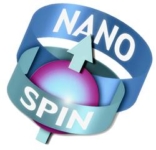Self-Organised Complex-Spin Magnetic Nanostructures
https://app.dimensions.ai/details/grant/grant.3761461

ACRONYM:
NANOSPIN
LEADER:
Kalliopi Trohidou
START DATE:
01/02/2005
LATE DATE:
30/04/2008
FUNDING SOURCE:
FP6-NMP